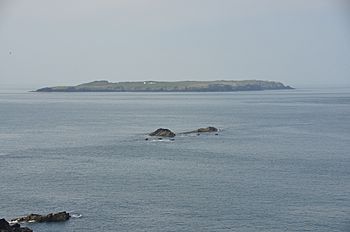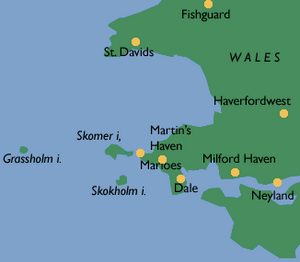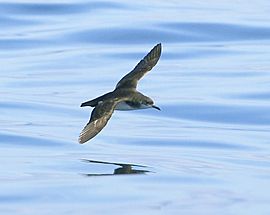Skokholm facts for kids
|
Native name:
Ynys Sgogwm
|
|
|---|---|

Skokholm from the mainland
|
|
| Lua error in Module:Location_map at line 420: attempt to index field 'wikibase' (a nil value). | |
| Geography | |
| Location | St George's Channel |
| Area | 106 ha (260 acres) |
| Length | 1.6 km (0.99 mi) |
| Width | .8 km (0.5 mi) |
| Administration | |
|
Wales
|
|
| County | Pembrokeshire |
| Community | Dale |
| Demographics | |
| Population | 2 |
Skokholm (Welsh: Ynys Sgogwm), also known as Skokholm Island, is a small island located off the coast of Pembrokeshire, Wales. It is about 2.5 miles (4 km) from the mainland. Skokholm is south of another island called Skomer.
The waters around Skokholm are a special marine reserve. Both Skokholm and Skomer are part of the Pembrokeshire Coast National Park. They are also protected as Sites of Special Scientific Interest because of their unique nature.
Contents
Island Geography: What Skokholm Looks Like
Skokholm is about 1 mile (1.6 km) long and 0.5 miles (0.8 km) wide. It covers an area of 106 hectares (262 acres). The island is made of Old Red Sandstone, a type of rock.
Its cliffs are very tall, ranging from 70 feet (21 meters) in the northeast to 160 feet (49 meters) in the southwest. These high cliffs protect the island from storms. This makes Skokholm a safe place for many seabirds to live and raise their young. The highest point on the island is 180 feet (55 meters) tall.
Skokholm's Past: A Look at its History
The name Skokholm might come from the Norse language. "Skógr" means "wood" and "holmr" means "small island." So, the Vikings might have called it "wooded island." This is interesting because no trees grow on the island today.
People have lived on Skokholm for thousands of years. Tools from the Stone Age have been found there. This shows that ancient people once called the island home.
In the 1200s, a powerful Earl of Pembroke, William Marshal the Younger, owned the island. Later, in the 1500s, Sir John Perrott was in charge of Skokholm. A map from 1578 shows the island named Skokeholme Insul.
Changing Owners: From Family to Wildlife Trust
In 1646, a barrister named William Philipps bought the island for £300. His family owned Skokholm for a very long time, about 360 years!
In 2005, the last family owner, Mrs. Osra Lloyd-Philipps, passed away. Her family decided to sell the island. They offered it first to the Wildlife Trust of South and West Wales. This trust had been looking after the island for 50 years.
After a big fundraising effort, the Wildlife Trust bought Skokholm in April 2006 for £650,000. In December 2008, the island was officially named a national nature reserve.
Skokholm Bird Observatory: Studying Birds
In 1933, Skokholm became the first bird observatory in Britain. It was started by Ronald Lockley, a famous bird expert. The main goal was to ring wild birds and study them. Bird ringing involves putting a small, numbered band on a bird's leg. This helps scientists track their movements and learn about their lives.
Lockley also started the Pembrokeshire Bird Protection Society in 1938. This group is now part of the Wildlife Trust of South and West Wales. The Wildlife Trust took over the lease of Skokholm in 1948.
Bird ringing on Skokholm stopped in 1976 for a while. However, the island has always been important for studying birds. It was a key place for research on storm petrels, razorbills, oystercatchers, and wheatears. In 2014, Skokholm Island was once again recognized as a bird observatory.
Natural Wonders: Plants and Animals
Island Geology: Skokholm's Rocks
Skokholm Island is made of mudstones and sandstones. These rocks are from a very old time period called the late Silurian and early Devonian ages. The rocks are folded in a special way, which you can see in the cliffs.
There are also areas of till on the island. Till is a type of soil left behind by glaciers from the last Ice Age.
Flora: Skokholm's Plants
Most of Skokholm is covered in simple grassland. In wetter areas, you can find heath plants. There are also some salt marsh areas near the coast.
Common plants found here include three-lobed water crowfoot, tree mallow, marsh St. John's wort, small nettle, and sea campion.
Fungi: Hidden Life
Scientists have studied the larger fungi on Skokholm for many years. One special type of fungus, Trechispora clanculare, was first found on the island in a puffin burrow. This means Skokholm is the "type locality" for this fungus. The island is also home to rare lichens, like the golden hair lichen.
Bird Life and Other Animals
Skokholm is famous for its amazing bird populations. It has the third largest colony of Manx shearwaters in the world. This means about 15% of all Manx shearwaters live here! It also has 20% of Europe's storm petrels.
In 2021, over 11,000 puffins were counted on Skokholm. This is the highest number since the 1940s! There are also many guillemots and razorbills. Other large bird colonies include lesser black-backed gulls, herring gulls, and great black-backed gulls.
Skokholm is also a breeding ground for oystercatchers, chough, skylark, and wheatear. Many migrating birds stop at Skokholm during their long journeys. These include chiffchaffs, willow warblers, whitethroats, redstarts, and pied flycatchers.
After the Norman invasion, people built a rabbit farm on the island. This means rabbits have lived on Skokholm for a very long time. Their grazing has shaped the island's grasslands. House mice were also accidentally brought to the island in the late 1800s.
Island Buildings: Lighthouse and Homes
The first Skokholm Lighthouse was built in 1776. It was rebuilt in 1861 at its current spot. This lighthouse, along with two others, helps guide ships safely into Milford Haven. The lighthouse became automated in 1983. This means it runs by itself and is controlled from a center far away.
The old farm cottage on the island was restored by Ronald Lockley. It is now a protected building. Other farm buildings have been turned into places where visitors can stay.
Getting to Skokholm: Transport and Access
Boats to Skokholm leave from Martin's Haven. Visitors who have booked a stay can travel to the island and enjoy its basic accommodation. In 2010, the island's landing jetty was improved. This project made it easier for boats to dock and for people to get on and off the island.
Images for kids
See also
 In Spanish: Skokholm para niños
In Spanish: Skokholm para niños




